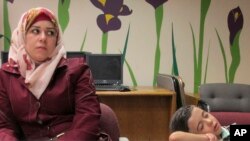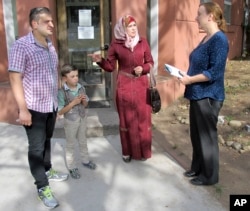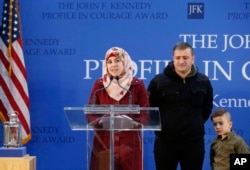As they waited in a refugee camp to come to America, Syrian couple Abdullah and Fatema were assured that the United States welcomes all people and that being Muslim would not be a problem.
Those expectations were first dashed when, upon arrival in the U.S. in November, Indiana Republican Gov. Mike Pence blocked their entry into his state and they were diverted to Connecticut.
In their new home state, they have been received warmly by many, including Connecticut's Democratic governor, but they say they also have faced difficulties with finding work and with discrimination. On balance, it has been a year of struggle for the family, who were among the first of the 10,000 Syrians resettled in the United States over the last year.
“There are people who are really good to us and try to help us every day,'' Fatema said through an interpreter at the Integrated Refugee & Immigrant Services office in New Haven as her 5-year-old son, Ayham, napped beside her. “But there are other people. We hear them and we feel unsafe. I feel bad for my child. Is something bad going to happen to us? We don't know.''
The couple gave only their first names out of security concerns.
Struggles with language
Abdullah owned a clothing store in Homs before it was destroyed in Syria's civil war. He would like to work at a store or dry cleaning business in Connecticut, but he has struggled to learn English. He works two days a week as a dishwasher as he continues looking for a full-time job.
“This is the hardest thing,” he said. “If I have the language, things would be better.”
Ayham is currently repeating kindergarten. His teachers feel he also needs to improve his English before moving on to first grade, his mother said.
IRIS, the resettlement agency, found housing for the family in New Haven and helped pay their rent. They also have assisted with the paperwork needed to apply for state benefits and have provided translators, transportation, food, cultural support, English classes and other necessities. But most of the financial support ended after about four months.
“The philosophy of refugee resettlement is the agencies like IRIS are responsible to get them off to a good start,” said Chris George, the agency's executive director. “Don't help them with rides or rent subsidies any longer than they need that. It's a tough, demanding self-help, pull-yourself-up-by-your-own-bootstraps kind of program.”
Fatema said the family was surprised and confused when they landed in the U.S., after learning about Indiana and making contacts there, to find out that Pence wanted to block Muslims from entering his state after Islamic extremists killed 130 in Paris.
Hope, despite broken heart
“It broke our hearts,” she said. “If you are in a group and one person did a bad thing, it doesn't mean the whole group is bad.”
A federal judge overturned attempts by Pence, the GOP's vice presidential nominee, to block resettlement efforts in Indiana.
“That was the only family that was moved, in spite of the number of governors that protested the placement of Syrians in their state,” said Barbara Day, the U.S. State Department's domestic resettlement section chief.
The family said they have become friendly with other refugees at IRIS. They help each other, sharing tips on cultural differences, or the best markets for shopping.
“When I feel bad about something, I come to IRIS,” Abdullah said. “When I feel happy about something, I come to IRIS. They have helped me a lot.”
The couple, who fled Syria in 2011 and underwent a lengthy vetting process while living in Jordan, said Americans should have no reason to fear them. They said they are hopeful about their future in this country, but after several years of fleeing violence and living in chaos, they have learned not to look too far ahead.
“We don't know what is going to happen,” Fatema said. “What we care about is just make us safe today.”






